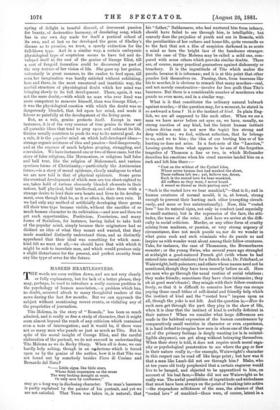PROTECTIVE DISEASES.
IT might be a great advantage to other people besides patho- logists and doctors, to understand better than we under- stand at present the modus operandi of that class of diseases which have more effect in strengthening the physical constitution for its future trials, than in weakening it for the time. There is so remarkable an analogy between the body and mind of man, that any advance in the knowledge of the one is almost sure to lead to an advance in the knowledge of the other. it is, for example, interesting to know that the germs of what might be probably fatal, or, at least, most disabling and dreadful disease, are often rendered almost innocuous at the time, as well as no less protective for the future, by being carefully cultivated under the influence of oxygen and heat. In other words, vital germs which are pernicious and poisonous to the body of man in their crude state, become comparatively harmless in their immediate effect—and purely beneficial in their future effect—if they are developed into a higher phase of their own existence, before being introduced into the body. Is it, perhaps, that if introduced in a cruder state, their self- developing energy robs the body of all the heat and oxygen needful for that fuller development ; while if introduced into the blood at a point nearer to full development, they rob us of much less which is essential to our own well-being, while communicating to us whatever security they contain against similar disease for the future with quite as much efficiency ? It may be conjectured at least, on the strength of the experi- ments which have been made, that the malignant in- fluence of these germs of protective disease is due rather- to the fact that they grow to perfection at our body's expense, before effecting the change in the constitution- which is our security against future disease of the same kind, than to the protective change itself. The protective change is effected equally well by receiving the advanced organism into the blood ; but the infant organism apparently feeds upon us before being assimilated by us, and it may well be the feeding upon us during the period of growth which injures us, not the assimilation. At least, that is a reasonable conjecture as to the meaning of the facts. And there is, we conceive, some- thing analogous to this in the intellectual and moral life. Unquestionably there are mental influences which are poisonous only when they are brought to bear on us in what may be called an unripe state, a state in which the victim of them has to contribute much of his own life, in order to ripen the influence which he is assimilating, before it can be really assimilated at all. Thus we should say that Rousseau's influence on Europe in the last century was far more of a virulent poison than Voltaire's; and chiefly, at least, because his was an influence in a very much less ripe condition, which exhausted the nations who took it in the effort to develope it, to make out what it really meant, whither it led them, and what sort of life it implied, while almost every one could grasp at once the import of Voltaire's general teach- ing. The great value of Carlyle's book on the French Revolu- tion is the power with which it apprehends the working of the moral yeast of Rousseau's teaching, and delineates its effects in bewildering the French people, in blinding them to a true knowledge of what their fraternal hysterics meant, and in even eating like a fungus into the French character, before it came to any maturity such as Europe could recognise, appreciate, and. profit by. The same kind of working of an obscure germ of mixed thought and feeling on character, in a field that is,. however, very much smaller both as regards moral and geo- graphical extent, may be found in the influence of the writings of Thackeray, whose strange blending of profound tenderness with profound cynicism of judgment, has proved a veritable ferment to the cultivated thought of a great portion of our own social world, feeding itself on our life, and developing itself in different minds into the most different varieties of scornful sympathy, or sympathetic scorn, for humanity and all its fruits. It is the half-developed idea, the crude thought, the union of com- plex but not the less co-operative and consistent elements which may grow into all sorts of different forms, according as you feed the moral germ with what proves stimulating to one or another element of its complex essence, which takes the most dangerous hold of human society, and prematurely exhausts the minds that most fully develope the latent seeds which it contains.
Sometimes you may note the same thing in relation to the effect produced on individual genius by the preying upon it of some parasitic worm of totally inferior organisation, which still seems to be, in some miserable way-, destined to haunt and destroy its finer life. Thus, as Hazlitt used to say, there was certainly a maggot in the wonderful brain of Shelley, which lived on the very texture of his character, and bred from it that hybrid off-
spring of delight in tuneful discord, of irreverent passion for beauty, of destructive harmony, of desolating song, which has in our own day made for itself a poetical school of its own, and at last so far developed the germ of Shelley's disease as to promise, we trust, a speedy extinction for the full-blown type. And in a similar way, a certain embryonic physiological type of scepticism seems to have fed and de- veloped itself at the cost of the genius of George Eliot, till a sort of fungoid formation could be discovered as part of the very texture of her vision of life. She gave up her genius, voluntarily in great measure, to the canker to feed upon, till even her imagination was hardly satisfied without exhibiting, here and there, in the most unnatural and inartistic way, the morbid structure of physiological doubt which her mind was bringing slowly to its full development. There, again, it was not the mere doubt,—with which no man who ever lived was more competent to measure himself, than was George Eliot,— it was the physiological emotion with which the doubt was so dangerously blended, that fed upon her mind, and made it labour so painfully at the development of the living germ.
But, as a rule, genius protects itself. Except in rare instances, it is of the very essence of true genius to throw off all parasitic ideas that tend to prey upon and exhaust its life. Genius usually contrives to push its way to its natural goal. As a rule, it is the popular mind on which half-developed ideas— strange organic mixtures of idea and passion—feed dangerously, and at the expense of much helpless groping, struggling, and convulsion. We have instanced one or two of these cases, but the story of false religions, like Mormonism, or religions half false and half true, like the religion of Mahommed, and various spurious forms of Christianity,—particularly the Antinomian forms,—is a story of moral epidemic, closely analogous to what we are now told is that of physical epidemic. Some germ the eventual development of which men are too short-sighted to see, takes hold of various obscurely blended elements in their nature, half physical, half intellectual, and stirs them with a strange desire to lend their own hearts and lives to its develop- ment, even though that be, as it so often is, their own ruin. If we had only any method of artificially developing these germs till their true type became visible, without the sacrifice of so much human character to its cultivation,—and now and then we get such opportunities, Positivism, Fourierism, and many forms of Socialism, for instance, having failed to take hold of the popular mind, simply because their originators had so distinct an idea of what they meant and wanted, that they made mankind distinctly understand them, and as distinctly apprehend that their ideal was something for which man- kind felt no want at all,—we should have that with which it might be safe to inoculate men, and which would produce only a slight disturbance for the present, and perfect security from any like type of error for the future.































 Previous page
Previous page